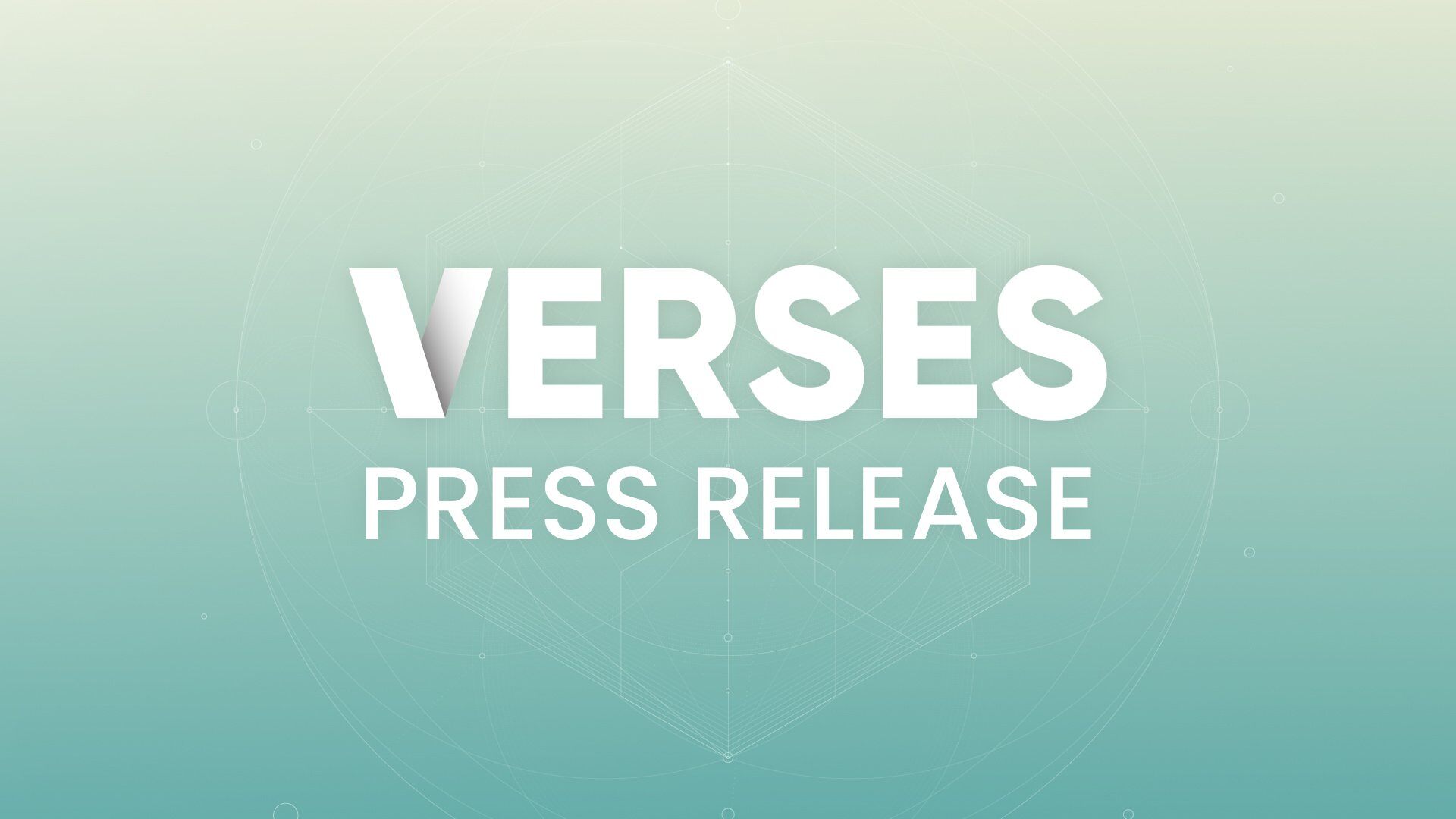5 min read
VERSES Publishes Pioneering Research Demonstrating More Versatile, Efficient, Physics Foundation for Next-Gen AI
 VERSES
:
Aug 1, 2024 12:00:00 AM
VERSES
:
Aug 1, 2024 12:00:00 AM

New research led by Karl Friston showcases new foundation for AI that achieves 99% accuracy with 90% less data on popular MNIST benchmark
Vancouver, BC – 30 July 2024 – VERSES AI Inc. (CBOE:VERS) (OTCQB:VRSSF) ("VERSES'' or the "Company”), a cognitive computing company specializing in next generation intelligent systems announces that a team, led by Chief Scientist, Professor Karl Friston, has published a paper titled, “From pixels to planning: scale-free active inference,” which introduces an efficient alternative to deep learning, reinforcement learning and generative AI called Renormalizing Generative Models (RGMs) that address foundational problems in artificial intelligence (AI), namely versatility, efficiency, explainability and accuracy, using a physics based approach.
‘Active inference’ is a framework with origins in neuroscience and physics that describes how biological systems, including the human brain, continuously generate and refine predictions based on sensory input with the objective of becoming increasingly accurate. While the science behind active inference has been well established and is considered to be a promising alternative to state of the art AI, it has not yet demonstrated a viable pathway to scalable commercial solutions until now. RGM’s accomplish this using a “scale-free” technique that adjusts to any scale of data.
“RGMs are more than an evolution; they’re a fundamental shift in how we think about building intelligent systems from first principles that can model space and time dimensions like we do,” said Gabriel René, CEO of VERSES. “This could be the ‘one method to rule them all’; because it enables agents that can model physics and learn the causal structure of information we can design multimodal agents that can not only recognize objects, sounds and activities but can also plan and make complex decisions based on that real world understanding—all from the same underlying model. This has the potential to dramatically scale AI development, expanding its capabilities, while reducing its cost.”
The paper describes how Renormalized Generative Models using active inference were effectively able to perform many of the fundamental learning tasks that today require individual AI models, such as object recognition, image classification, natural language processing, content generation, file compression and more. RGMs are a versatile “universal architecture” that can be configured and reconfigured to perform any or all of the same tasks as today’s AI but with far greater efficiency. The paper describes how an RGM achieved 99.8% accuracy on a subset of the MNIST digit recognition task, a common benchmark in machine learning, using only 10,000 training images (90% less data). Sample and compute efficiency translates directly into cost savings and development speed for businesses building and employing AI systems. Upcoming papers are expected to further demonstrate the effective and efficient learning of RGMs and related research applied to MNIST and other industry standard benchmarks such as the Atari Challenge.
"The brain is incredibly efficient at learning and adapting and the mathematics in the paper offer a proof of principle for a scale-agnostic, algorithmic approach to replicating human-like cognition in software," said Friston. Instead of conventional brute-force training on a massive number of examples, RGMs “grow” by learning about the underlying structure and hidden causes of their observations. "The inference process itself can be cast as selecting (the right) actions that minimize the energy cost for an optimal outcome," Friston continued.
Your brain doesn't process and store every pixel independently; instead it “coarse-grains” patterns, objects, and relationships from a mental model of concepts - a door handle, a tree, a bicycle. RGMs likewise break down complex data like images or sounds into simpler, compact, hierarchical components and learn to predict these components efficiently, reserving attention for the most informative or unique details. For example, driving a car becomes “second nature” when we’ve mastered it well enough such that the brain is primarily looking for anomalies to our normal expectations.
By way of analogy, Google Maps is made up of an enormous amount of data, estimated at many thousands of terabytes, yet it renders viewports in real time even as users zoom in and out to different levels of resolution. Rather than render the entire data set at once, Google Maps serves up a small portion at the appropriate level of detail. Similarly, RGMs are designed to structure and traverse data such that scale – that is, the amount, diversity, and complexity of data – is not expected to be a limiting factor.
“Within Genius, developers will be able to create a variety of composable RGM agents with diverse skills that can be fitted to any sized problem space, from a single room to an entire supply network, all from a single architecture,” says Hari Thiruvengada, VERSES's Chief Product Officer.
Further validation of the findings in the paper is required and expected to be presented in future papers slated for publication this year. Thiruvengada adds, “We’re optimistic that RGMs are a strong contender for replacing deep learning, reinforcement learning, and generative AI.”
The full paper is expected to be published on arxiv.org later this week. A webinar featuring Professor Karl Friston discussing the landmark paper is expected to be announced in August.
About VERSES
VERSES is a cognitive computing company building next-generation intelligent software systems modeled after the wisdom and genius of Nature. Designed around first principles found in science, physics and biology, our flagship product, Genius™, is a toolkit for developers to generate intelligent software agents that enhance existing applications with the ability to reason, plan, and learn. Imagine a Smarter World that elevates human potential through technology inspired by Nature. Learn more at verses.ai, LinkedIn, and X.
On behalf of the Company
Gabriel René, Founder & CEO, VERSES AI Inc.
Press Inquiries: press@verses.ai
Investor Relations Inquiries
U.S., Matthew Selinger, Partner, Integrous Communications, mselinger@integcom.us 415-572-8152
Canada, Leo Karabelas, President, Focus Communications, info@fcir.ca 416-543-3120
Cautionary Note Regarding Forward-Looking Statements
When used in this press release, the words "estimate", "project", "belief", "anticipate", "intend", "expect", "plan", "predict", "may" or "should" and the negative of these words or such variations thereon or comparable terminology are intended to identify forward-looking statements and information. Although VERSES believes, in light of the experience of their respective officers and directors, current conditions and expected future developments and other factors that have been considered appropriate, that the expectations reflected in the forward-looking statements and information in this press release are reasonable, undue reliance should not be placed on them because the parties can give no assurance that such statements will prove to be correct. The forward-looking statements and information in this press release include, among others, current and future research projects, benchmark testing, as well as the beta and launch of Genius. Such statements and information reflect the current view of VERSES.
There are risks and uncertainties that may cause actual results to differ materially from those contemplated in those forward-looking statements and information. In making the forward-looking statements in this news release, the Company has applied various material assumptions. By their nature, forward-looking statements involve known and unknown risks, uncertainties and other factors which may cause our actual results, performance or achievements, or other future events, to be materially different from any future results, performance or achievements expressed or implied by such forward-looking statements. There are a number of important factors that could cause VERSES actual results to differ materially from those indicated or implied by forward-looking statements and information. Such factors include, among others: the ability of the Company to use the proceeds of the Private Placement as announced or at all; currency fluctuations; limited business history of the parties; disruptions or changes in the credit or security markets; results of operation activities and development of projects; project cost overruns or unanticipated costs and expenses; and general development, market and industry conditions. The Company undertakes no obligation to comment on analyses, expectations or statements made by third parties in respect of its securities or its financial or operating results (as applicable).
VERSES cautions that the foregoing list of material factors is not exhaustive. When relying on VERSES’ forward-looking statements and information to make decisions, investors and others should carefully consider the foregoing factors and other uncertainties and potential events. VERSES has assumed that the material factors referred to in the previous paragraph will not cause such forward-looking statements and information to differ materially from actual results or events. However, the list of these factors is not exhaustive and is subject to change and there can be no assurance that such assumptions will reflect the actual outcome of such items or factors. The forward-looking information contained in this press release represents the expectations of VERSES as of the date of this press release and, accordingly, are subject to change after such date. VERSES does not undertake to update this information at any particular time except as required in accordance with applicable laws.
VERSES to Release Atari Benchmark Results at World Economic Forum in Davos

